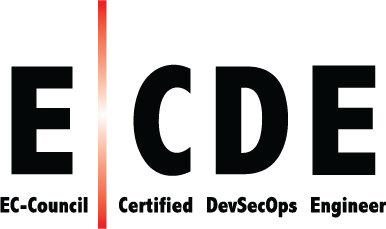EC-Council Certified DevSecOps Engineer (E|CDE)


Description
EC-Council's Certified DevSecOps Engineer (E|CDE) is a hands-on, instructor-led comprehensive DevSecOps certification program that helps professionals build the essential skills needed to design, develop, and maintain secure applications and infrastructure.
EC-Council's Certified DevSecOps Engineer (E|CDE) v2 is a lab-intensive, practical course that incorporates the use of AI in DevSecOps and equips professionals with relevant skills to design, develop, and maintain secure applications and infrastructure. It covers both application and infrastructure in on-premises and the top 3 cloud-native platforms-AWS, Azure, and GCP.
This program enables you to integrate security at every phase of the software development lifecycle (SDLC) using various tools and methodologies. It combines DevOps principles and practices with security measures, allowing organizations to deliver secure applications at the speed of DevOps.
Target group
- C|ASE-certified professionals
- Application security professionals
- DevOps engineers
- Software engineers and testers
- IT security professionals
- Cybersecurity engineers and analysts
- Anyone with prior knowledge of application security who wants to build their career in DevSecOps
Training Program
Module 01: Understanding DevOps Culture
This module introduces the principles and concepts of DevOps. It covers the cultural and technical foundations of DevOps, emphasizing collaboration between development and operations teams. Key topics include the significance of automation, continuous integration/deployment (CI/CD), and fostering a culture of continuous improvement. The module also covers DevOps values, benefits, and challenges, along with the role of collaboration, communication, and feedback loops in achieving faster and more reliable software delivery.
Module 02: Introduction to DevSecOps
This module covers the foundational concepts of DevSecOps, focusing on integrating security into the DevOps lifecycle. It explains the principles and importance of DevSecOps, emphasizing the shift from traditional security approaches to a more collaborative, automated, and continuously integrated security approach. The module introduces key components such as culture, automation, monitoring, and feedback loops, along with commonly used tools and practices. It also discusses the benefits of adopting DevSecOps, addresses its key challenges, and provides insights into establishing a DevSecOps culture within organizations.
Module 03: DevSecOps Pipeline - Course Outline
This module covers the planning phase of the DevSecOps pipeline. It focuses on identifying security requirements, conducting threat modeling, and establishing a security-focused plan. It also highlights the importance of collaboration between development, security, and operations teams to ensure alignment with security goals.
Module 04: DevSecOps Pipeline - Code Stage
This module discusses secure coding practices and the integration of security into the development process. Topics include static code analysis, secure coding guidelines, and the implementation of security controls within the integrated development environment (IDE). Developers learn to write secure code using industry best practices.
Module 05: DevSecOps Pipeline - Build and Test Stage
In this module, learners explore how to integrate security into the build and testing processes. It covers automated security testing, including SAST and DAST. It also emphasizes the use of continuous integration (CI) pipelines.
Module 06: DevSecOps Pipeline - Release and Deploy Stage
This module explains how to maintain security during the release and deployment phases. It highlights secure deployment techniques, IaC security, and the use of container security tools. It also covers release management and secure configuration practices.
Module 07: DevSecOps Pipeline - Operate and Monitor Stage
The final module focuses on securing the operational environment and monitoring applications for security incidents. It includes topics like logging, monitoring, and incident detection and response. It also discusses continuous security monitoring using security information and event management (SIEM) tools.
Goal
- You will be well-prepared to manage security incidents and maintain operational resilience
- You will discover how to leverage AI-powered tools for the DevSecOps pipeline, thereby enhancing automation
- You will gain familiarity with various open-source and commercial third-party DevSecOps tools, which enable the secure development of software and web applications within an organization's internal IT infrastructure as well as in a public cloud environment
- You will gather insights into application DevSecOps as well as infrastructure DevSecOps
- You will hone your skills to detect and remediate security issues while developing application codes by utilizing automated application security testing such as SAST, DAST, IAST, and RASP
Recommended
- Students should have an understanding of application security concepts.
- Language : English
- Level : Advanced
- Certification body : EC-Council
- Certification: Yes
- Accessibility : Yes
Important information:
Our courses are not registered with the Répertoire National des Certifications Professionnelles (RNCP), but they do comply with the requirements of the Répertoire Spécifique (RS).
